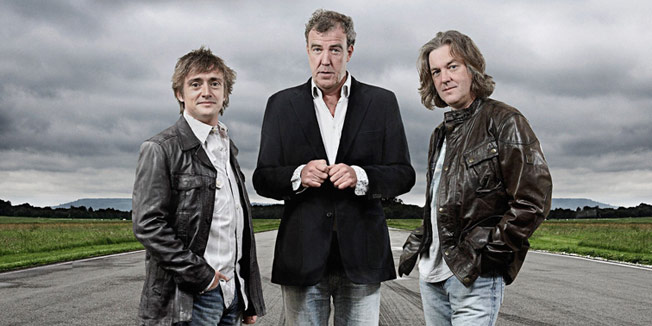Will Top Gear be any good without Clarkson punches?

Following an alleged punch-up with producer Oisin Tymon over a cheese platter, Top Gear presenter Jeremy Clarkson was once again in the news for bad behaviour.
The action may appear an addition to the stream of Clarkson’s blunders but this may well be his last in connection with Top Gear. Following Clarkson’s suspension and the subsequent cancellation of Top Gear‘s last three episodes, rumours suggest that he will not be returning to the BBC after his contract ends this month.
The audience is familiar with Clarkson’s crude opinions and laddish banter and this is possibly the reason the stunt-filled motor show Top Gear is so popular and is watched in 214 territories by 350 million people and dubbed into eight languages.
Last year he apologised after being accused of using the N-word and when his “H932 FKL” number plate caused rage in an Argentinian town, which some people thought referred to the Falklands conflict of 1982.
Despite over 400,000 fans signing a petition to reinstate Clarkson, and David Cameron rushing to his defence, describing his friend as a “huge talent” and saying that his children would be “heartbroken” if he left, it is comforting to know that “punching” producers is not to be taken lightly.
Leaving his North London home Clarkson admitted that he had regrets over the recent “fracas” and that he was heading “off to the job centre”.
While the BBC pursues their investigation into the matter, the future of Top Gear hangs in limbo. It is possible to reinvent a popular programme, as exemplified by other TV shows: The Graham Norton Show which replaced Jonathan Ross’s prime time slot, and Masterchef: The Professionals, which has gone from strength to strength after Marcus Wareing replaced Michel Roux Junior; Have I Got News for You also continues to remain highly successful, even after the departure of Angus Deayton.
However, for Top Gear the situation somehow seems different and difficult. Clarkson is Top Gear and Top Gear is Clarkson, a reinvention would without a doubt change the DNA of the programme.
Nevertheless, having run for over a decade, it is perhaps time for the show to end. The series began in 1977 and was relaunched in its current format in 2002, and over the years in spite of being too formulaic, with repetitive stints, habitual jokes it gained constant popularity and has been the most widely watched factual television programme in the world.
They say all good things must come to an end, and with Clarkson arguably spoilt over the years and misbehaving like a naughty child, the public does not want to see a reinvented Top Gear, which without Clarkson’s bravado and foolish behaviour would somehow seem a sorry shadow of its former self.
Perhaps it is time for a new car show; something intelligent, something thoughtful, something new. But if you are worried that you may miss Clarkson and his punches: don’t be. Other channels certainly recognise his “pull,” with ITV already drawing up a multi-million pound deal, it seems the big-mouthed host will not be at the job centre for very long.
Elizabeth Gregory
Photo: Courtesy of Top Gear























Facebook
Twitter
Instagram
YouTube
RSS